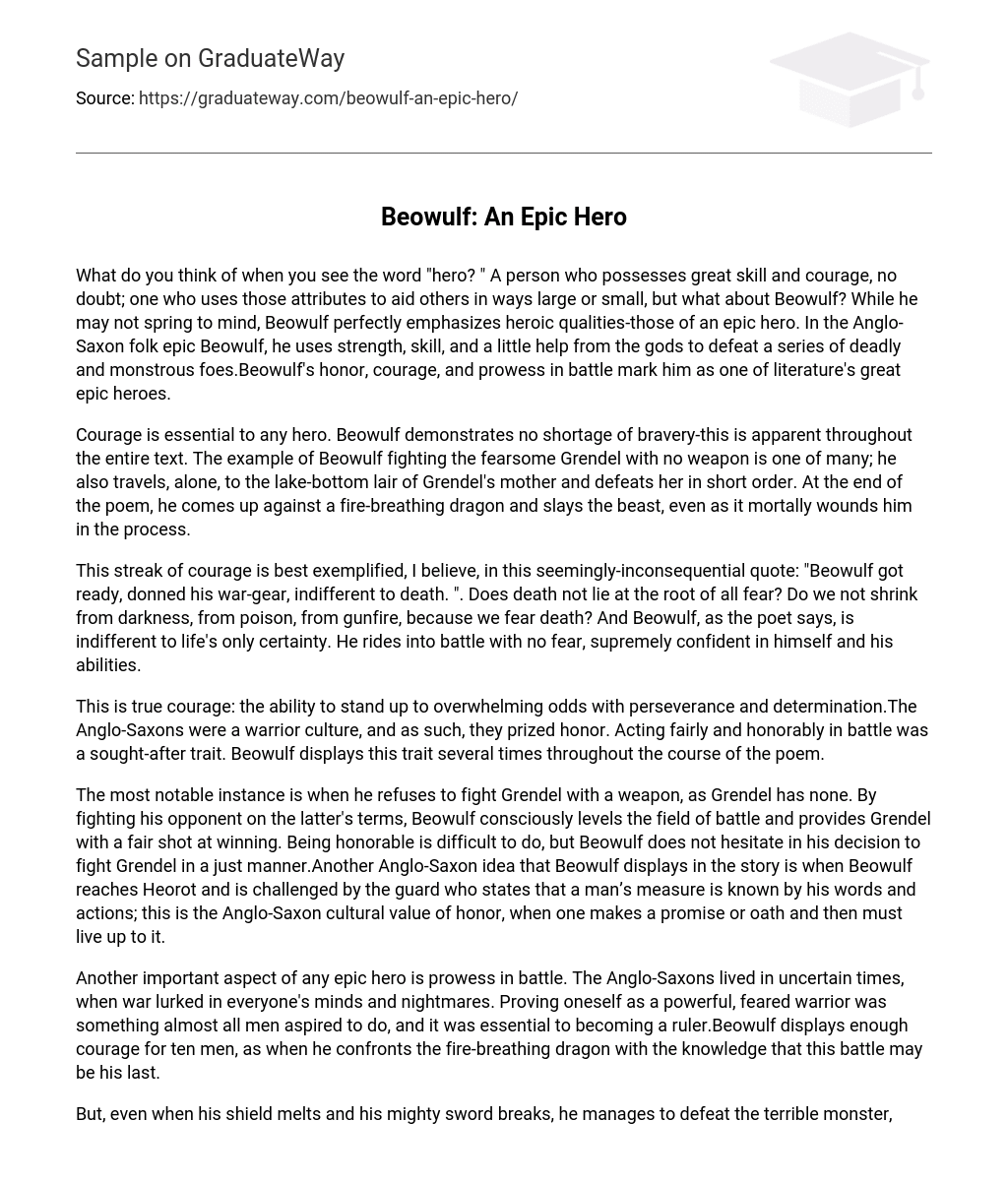When you think of the word “hero,” what comes to mind? Most likely, a person who possesses great skill and courage, who uses those attributes to help others in various ways. However, when it comes to Beowulf, he may not be the first thing that pops into your head. Nevertheless, Beowulf perfectly exemplifies the qualities of an epic hero in the Anglo-Saxon folk epic Beowulf. He utilizes his strength, skill, and assistance from the gods to overcome a sequence of dangerous and monstrous enemies. Furthermore, Beowulf’s honor, courage, and prowess in battle distinguish him as one of literature’s exceptional epic heroes.
Throughout the text, Beowulf consistently exhibits courage, a vital quality for a hero. An outstanding example of this is when he fearlessly engages in combat with the formidable Grendel, relying solely on his strength and without any weapons. Furthermore, he displays his bravery by personally venturing into the underwater lair of Grendel’s mother and triumphantly defeating her. Finally, despite suffering severe injuries, Beowulf confronts a fire-breathing dragon at the conclusion of the poem and ultimately emerges triumphant.
This passage highlights Beowulf’s exceptional bravery, as demonstrated by the seemingly unimportant quote: “Beowulf got ready, donned his war-gear, indifferent to death.” Isn’t death the origin of all fear? Whether it is darkness, poison, or gunfire, we recoil because we are afraid of death. However, as emphasized by the poet, Beowulf exhibits no concern for life’s sole certainty. He fearlessly engages in the fight, emitting unwavering confidence in his skills and powers.
This is genuine bravery: the capacity to confront insurmountable challenges with persistence and resolve. The Anglo-Saxons cherished honor as a warrior culture. Demonstrating fairness and honor during battle was a highly esteemed characteristic. Beowulf exhibits this attribute numerous times within the poem.
Throughout the story, Beowulf embodies the Anglo-Saxon values of honor and fairness. One instance of this is when he chooses not to use a weapon against Grendel, who is unarmed. By engaging in combat with Grendel on equal terms, Beowulf levels the playing field and gives him a fair chance to succeed. This decision demonstrates Beowulf’s unwavering commitment to honor. Another example of Beowulf personifying Anglo-Saxon ideals occurs when he arrives at Heorot and encounters a guard who believes that one’s character can be judged based on their actions and words. This highlights the cultural importance of honor as Beowulf is obligated by his promise or oath to uphold his own principles.
Another crucial element of an epic hero is their skill in combat. The Anglo-Saxons dwelled in a period filled with uncertainty, where the specter of war haunted their thoughts and dreams. Demonstrating one’s strength as a formidable and dreaded warrior was a goal shared by nearly all men, and it was vital for their aspiration to become a ruler. Beowulf exhibits a tremendous amount of bravery equivalent to that of ten men, particularly when he confronts the dragon capable of spewing fire, fully aware that this conflict might be his final one.
But, even when his shield melts and his mighty sword breaks, he manages to defeat the terrible monster, with the help of his loyal follower Wiglaf. Also, his battle with Grendel can again be used as an apt example here; Beowulf struck down with his bare hands the beast that many other men, with powerful weapons, had failed to defeat. He then went on to slay Grendel’s mother in a fierce battle where, “she ripped and tore and clawed at him, bit holes in his helmet..
. She repaid him by clutching him with her claws and tearing wildly at him. Beowulf demonstrates his strength and skill to gain the advantage in battle, without ever resorting to deceitful tactics. This exemplifies the qualities of a genuine warrior.
The story of Beowulf has been handed down through generations due to his numerous admirable qualities. The warring society of the Anglo-Saxons highly valued bravery, honor, and skill in battle. Despite living in a different era, we can still admire and embrace their principles and beliefs. Exhibiting honor and bravery is challenging, particularly when it would be simpler to take the easier path or have others fight on our behalf.
However, we should all strive for honor and courage as moral traits, whether for our own benefit or for the benefit of others. Beowulf’s altruistic actions include slaying Grendel and Grendel’s mother to assist Hrothgar and killing the dragon to safeguard his people. We should all aspire to emulate Beowulf’s compassionate example.





